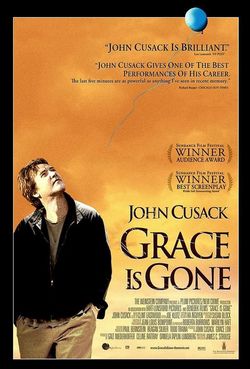 “Grace is Gone” is built on a simple premise: Grace Phillips, a soldier, wife and mother of two, is killed in the war in Iraq. Her husband, Stanley Phillips, played by John Cusack, is left to break the terrible news to their daughters, ages eight and twelve.
“Grace is Gone” is built on a simple premise: Grace Phillips, a soldier, wife and mother of two, is killed in the war in Iraq. Her husband, Stanley Phillips, played by John Cusack, is left to break the terrible news to their daughters, ages eight and twelve.
The girls are too old to buy that “Mommy is playing now with Nibbles the deceased pet hamster in a field of lollipops” and they’re too young to wax theological or existential, so what’s a socially-awkward, nebbishly-named, home-supply store manager father to do? With nary a clue himself, he takes them on an impromptu cross-country road trip to Enchanted Gardens, their favorite amusement park and last chance for a high-note memory of a normal childhood.
The plot may sound far-fetched, but in a country where the reality of mortality makes people stick their fingers in their ears and chant “lalalalala,” perhaps this film is truer to life than we’d like to admit. Something uncomfortable to talk about? Nothing a bag of cotton candy and a few roller coaster rides can’t cure! All hail the shiny credit card as panacea whenever we feel pain and confusion in our lives.
Though I initially found it odd that this movie about parental death contained no talk of religion or spirituality, I ended up finding that to be one of its strongest points. It deals, quite simply, in the here and now of these characters’ lives, addressing what each of us may or may not do to merely survive in a similar situation.
After all, aren’t religious doctrine and belief little more than a Band-Aid in such a traumatic scenario as this one? Does “God wanted Mommy back” do anything to stop a child (or adult, for that matter) from asking, “But why? Why her? Why now?” Or, to the contrary, are dogma and faith the only things that can bridge the void of a recently-deceased parent?
Grace, the actress and character, is anonymous in the film; she is little more than the voice on the home answering machine that Stanley calls from the road when seeking comfort and guidance from her once-spoken words. In that sense, she is as invisible as divine grace which, to me, is always waiting in the wings, patiently watching over us as we work through our issues, here watching Stanley struggle to make sense of his own grief before helping his daughters deal with their own.
In terms of a review for this “who-the-heck-is-the-audience?” film, the two girl actors are quite wonderful: the youngest girl still has that silly exuberance that makes all of her dialogue sound unscripted while the oldest girl portrays a subtle maturity that intimates how she has dealt with her mother’s past deployments.
Besides the fact that I suffered a case of Heavy Eyelids during the course of this 85-minute flick, my biggest critique is that, while I applaud John Cusack for venturing away from his typical repertoire, his shoulder-hunching, pigeon-toeing, eyeglass-pushing character’s extreme mannerisms too often pulled me out of the film. I mean, I don’t think I’m still holding him responsible for those precious hours I put into “1408” that I’ll never see again.
In any event, “Grace is Gone” is a respectful, intimate character study of a truly miserable real-life situation that happens any time a soldier parent is lost in combat. As we race headfirst into the holiday season with its emphasis on family, this film may, unfortunately, have more emotional resonance with the American public since the war in Iraq began than anyone would care to admit.
–-This post was written by Todd Havens


